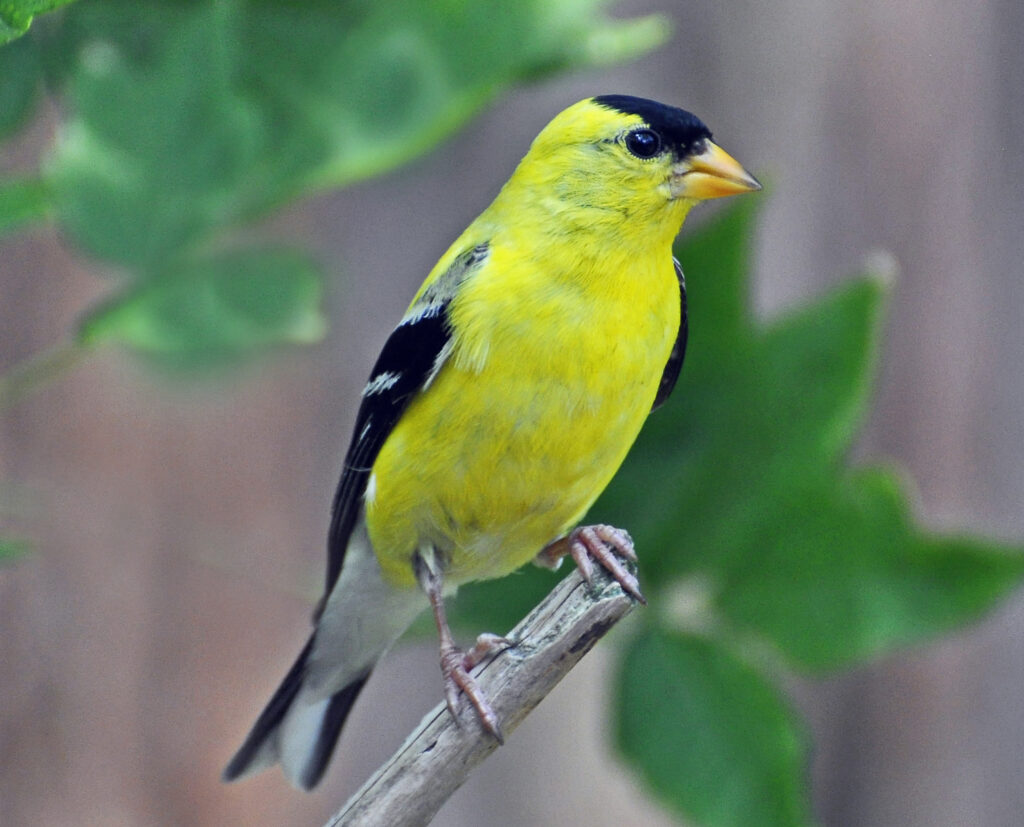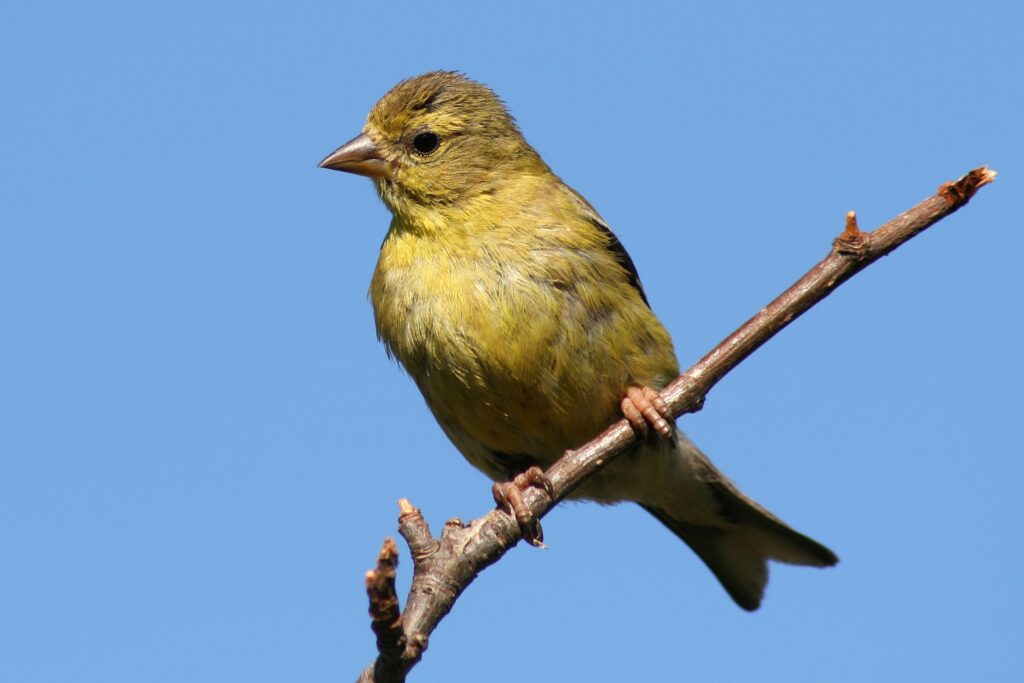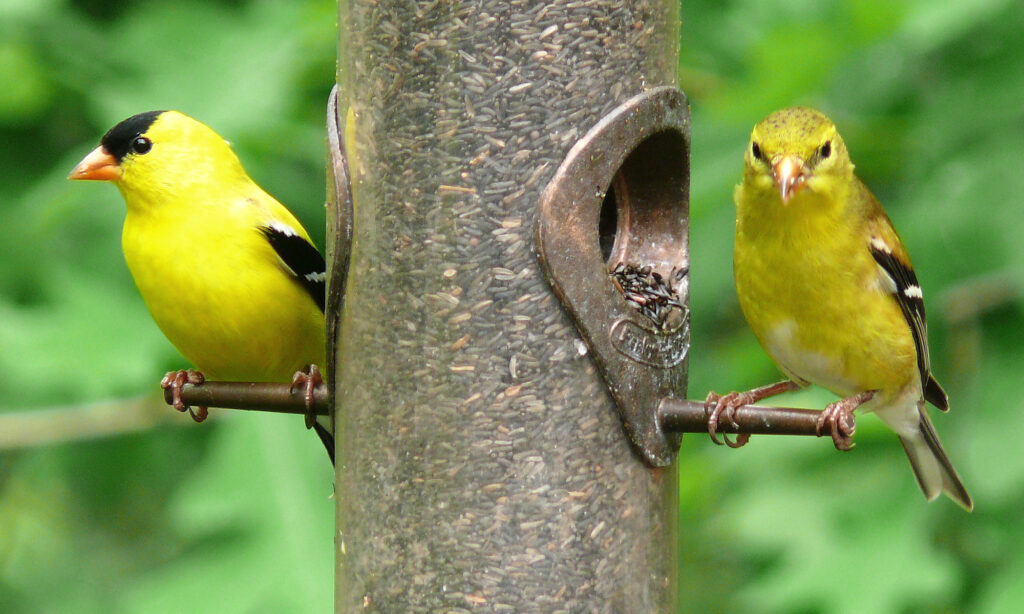Appreciating the “Wild Canary,” State Bird of New Jersey, Iowa, and Washington
The American Goldfinch, often fondly referred to as the “wild canary” for its vibrant yellow plumage, is a beautiful and charismatic bird that will brighten up any birdwatcher’s day. These delightful little gems are a common sight in many parts of North America. Let’s take a look at them.
Geographic Range
The American Goldfinch — Spinus tristis — can primarily be found in much of North America. You’ll spot them from the southern parts of Canada to the northern regions of Mexico. They’re year-round residents in some areas, while others will only see them during the summer months. This yellow ball of sunshine can be found in forests, fields, gardens, meadows, and even in urban settings.

(Uploaded by snowmanradio, CC BY 2.0, https://commons.wikimedia.org/w/index.php?curid=20388809)
Mating, Nesting, and Breeding Habits
Goldfinches are late bloomers in the mating game. They typically start looking for love in late spring or early summer. Their courtship is a charming affair as the males show off their bright yellow feathers in hopes of attracting a mate.
Once a pair forms, they’ll work together to build a cozy nest. Unlike many birds, goldfinches are late nesters. They wait until thistle plants go to seed — typically in July — using the down from these plants to line their nests, which provides a soft and comfortable surface for their young.
Migration
Goldfinches are known for their seasonal migrations, particularly in the northern regions. They’re often described as “short-distance migrants,” meaning they don’t travel thousands of miles. Instead, they move to areas with more abundant food sources. These movements can vary depending on food availability and weather conditions.
Diet
When it comes to feeding, goldfinches are rather picky eaters. They have a strong preference for seeds, and thistle seeds are at the top of their menu. Sunflower seeds are also a favorite. They’re skillful in removing seeds from their husks with their specialized bills. During breeding season, they may incorporate some insects into their diet to provide protein for their growing chicks.
Folklore
The American Goldfinch has woven itself into the tapestry of American folklore. In many Native American cultures, the goldfinch is seen as a symbol of summer, happiness, and the sun; and it’s believed that seeing a goldfinch is a sign of good luck and positive energy.

(Own work, CC BY-SA 3.0, https://commons.wikimedia.org/w/index.php?curid=7859712)
In some traditions, their vibrant yellow plumage symbolizes joy and brightness.
Ideal Birdwatching Spots
If you’re an aspiring birdwatcher or just a nature-lover and want to catch a glimpse of these charming birds, you’re in luck. Goldfinches are relatively common and can be found in a variety of environments. Look for them in open fields, meadows, and parks. They love to hang out in gardens with lots of flowers and shrubs, where they can find plenty of seeds. For urban birdwatchers, don’t underestimate the allure of your own backyard, as goldfinches may pay a visit if you create the right conditions.

(From personal website of photographer via Wikipedia), Public Domain,
https://commons.wikimedia.org/w/index.php?curid=2131314
Attracting Goldfinches
If you’d like to invite these lovely creatures into your own backyard, there are a few things you can do. First and foremost, offer them a buffet of seeds. Planting sunflowers, coneflowers, and, of course, thistle (also known as nyjer) will do the trick. These plants provide not only food but also a place for goldfinches to build their nests.
It’s essential to provide a consistent source of fresh water. A birdbath or a small water feature can make your garden even more appealing. Goldfinches are known to take refreshing baths during hot summer days. As always, make sure to clean and sanitize birdbaths two or three times per week.
Goldfinches will not use bird houses or nesting boxes, but they will take nesting material from piles or holders if you make them available. Natural nesting materials such as dandelion, thistle, or milkweed down are preferred, and balls of natural cotton can also tempt them.
Another tip is to be patient. Goldfinches are social birds, and once a few of them discover your bird-friendly yard, more are likely to follow. Consider hanging a few bird feeders and keeping them stocked year-round to keep your feathered friends coming back.
So there you have it. The American Goldfinch is one of the most vibrant and joyful parts of the birdlife to be found in North America. Their beautiful plumage, unique nesting habits, and delightful personalities make them a treasure for birdwatchers. Whether you’re an experienced enthusiast or just starting your birdwatching journey, you’re sure to love these charming little birds. Happy birdwatching!
By Steven Roberts



